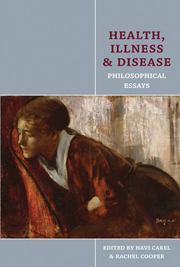Book contents
- Frontmatter
- Contents
- Acknowledgements
- Contributors
- Introduction
- Part I Concepts of health and disease
- 1 The opposition between naturalistic and holistic theories of health and disease
- 2 Health and disease: social constructivism as a combination of naturalism and normativism
- 3 Towards autonomy-within-illness: applying the triadic approach to the principles of bioethics
- 4 The concept of “mental disorder”
- Part II The experience of illness
- Part III Illness and society
- Bibliography
- Index
2 - Health and disease: social constructivism as a combination of naturalism and normativism
from Part I - Concepts of health and disease
- Frontmatter
- Contents
- Acknowledgements
- Contributors
- Introduction
- Part I Concepts of health and disease
- 1 The opposition between naturalistic and holistic theories of health and disease
- 2 Health and disease: social constructivism as a combination of naturalism and normativism
- 3 Towards autonomy-within-illness: applying the triadic approach to the principles of bioethics
- 4 The concept of “mental disorder”
- Part II The experience of illness
- Part III Illness and society
- Bibliography
- Index
Summary
What is health? What is disease? Thirty years of literature has failed to deliver an answer. Instead a protracted debate has been carried out over one single question: are the concepts of health and disease value-free? Naturalists ardently argue in favour, whereas normativists equally vehemently oppose. It is time for a different approach.
In sociology, a firmly held doctrine maintains that health and disease are socially constructed (Nettleton 2006), but this claim has not been philosophically unpacked. In this chapter I begin that task. I first give a brief and general characterization of social contructivism as the claim that a social construct is not fixed or inevitable, but is the contingent result of social and historical processes. I then present one main argument in favour of a social constructivist approach to health and disease: social constructivism provides a novel and particularly promising way of combining naturalist and normativist lines of thought. This argument is supported, first, by a brief discussion of the problems for and promises of naturalist and normativist analyses and, second, by a demonstration that social constructivism explains the strengths and weaknesses of either approach, and can unite them in a manner that retains the former while avoiding the latter.
HEALTH AND DISEASE: THE DEBATE SO FAR
Why have philosophers attempted to find out what health and disease are? Because it is thought that this would answer other questions. Most people, for example, agree that our health service should treat diseases, and finding out what diseases are, therefore, might help us decide the often difficult question of who to treat (e.g. Daniels 1985; Cooper & Megone 2007). Another common thought is that treatment can be permissible where enhancement is not. An understanding of the difference between enhancement and treatment is predicated on understanding the difference between health and disease. Finally, an understanding of what health and disease are might help us understand the proper scope or goal of clinical medicine.
- Type
- Chapter
- Information
- Health, Illness and DiseasePhilosophical Essays, pp. 37 - 56Publisher: Acumen PublishingPrint publication year: 2012

